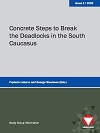Concrete Steps to Break the Deadlocks in the South Caucasus
20th Workshop of the PfP Consortium Study Group "Regional Stability in the South Caucasus”
Dokumenttyp:
Study Group InformationErscheinungsdatum:
März 2020Herausgeber:
Dr. Frédéric Labarre, Dr. George NiculescuVerlag:
Study Group Information - Austrian National Defence Academy in co-operation with the PfP Consortium of Defense Academies and Security Studies InstitutesISBN:
978-3-903121-83-6Seiten:
209Autor(en):
Ahmad Alili, Hrachya V. Arzumanian, Armine Arzumanyan, Michael Cecire, Stepan Grigoryan, Tomáš Hoch, Vagif Jahangirov, Dr. Frédéric Labarre, Prof. Dr. Ayse Nilufer Narli, Dr. George Niculescu, MA, PhD Elkhan Nuriyev, Andrei Rusakovich, Michael G. Schmunk, Laura Taniia, Georgy Turava, Alan WhitehornBeiträge in dieser Publikation:
Vorwort
"Out of the box thinking” was on the agenda of the 20th Regional Stability in the South Caucasus Study Group (RSSC SG) workshop. After several workshops dealing with geopolitical issues, and a stock-taking workshop in 2018, the co-chairs re-directed attention to the need for practical, ground-based initiatives to foster greater stability at the grass-roots and community levels.
Speakers from the region were required to concentrate on what outcomes and conditions could break the current deadlocks in moving towards peace and regional stability. Although deadlocks in South Caucasus conflict resolution were hardly broken, fresh consensus emerged among participants inter alia on: commonly held interests being defined and leveraged as confidence building to facilitate rapprochement and eventually lead to conflict resolution; administrative and identity issues being maintained cleanly separated; and the need to fully de-politicize issues addressed by peacebuilding initiatives.



